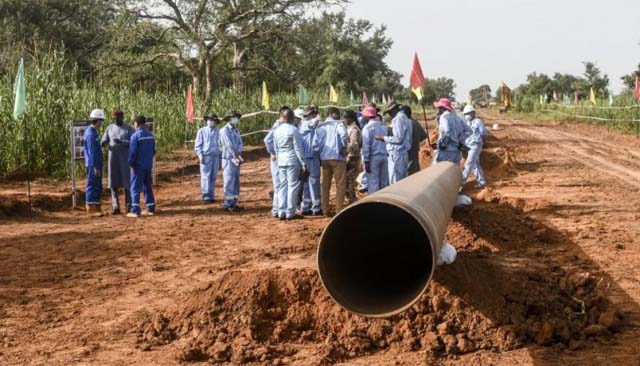
NIAMEY, June 22 (NNN-AGENCIES) — Niger’s military rulers have confirmed the sabotage of an oil pipeline carrying crude oil to neighbouring Benin after a rebel movement seeking the release of the country’s president claimed responsibility for the attack.
On the night of June 16-17, “malicious individuals sabotaged part of the pipeline in the Tesker department,” public television Tele Sahel reported Friday evening.
“We have already gathered information and clues on the alleged perpetrators” and “all those who contributed will be arrested and judged in accordance with their terrorist act,” said the governor of Zinder region, Colonel Issoufou Labo, who went to the scene of the attack.
“We know which group is the author of the act (which it has also) claimed,” said public prosecutor Ousmane Baydo.
On Monday, the rebel Patriotic Liberation Front (FPL), which is fighting for the release of president Mohamed Bazoum, said it had targeted the pipeline as a message to Niger’s military generals.
The FPL was created in August 2023 after the overthrow of Bazoum in a military coup on July 26. Since then, he has been imprisoned at the presidential palace in the capital Niamey.
FPL leader Mahamoud Sallah has demanded the release of the democratically-elected president and threatened to attack oil installations.
He has also called on the Chinese company WAPCO and the state-owned China National Petroleum Corporation, which run the pipeline, to halt their funding to Niger’s army regime.
The attack had damaged the pipeline and led to a crude oil leak, Tele Sahel said, with images showing an oil spill stretching more than 370 metres in the bush.
Landlocked Niger needs the pipeline to export its crude from Benin’s Atlantic port of Seme-Kpodji.
Besides the rebels, the pipeline is also at risk from other violent groups.
On June 12, six Nigerien soldiers providing a security detail were killed in the first-ever attack on the pipeline by “armed bandits” in the south, according to the army.
Vital to both the Nigerien and Beninese economies, the 2,000-kilometre-long pipeline has also become the subject of a diplomatic spat between the two West African neighbours, whose relations have been tense since the coup. — NNN-AGENCIES






